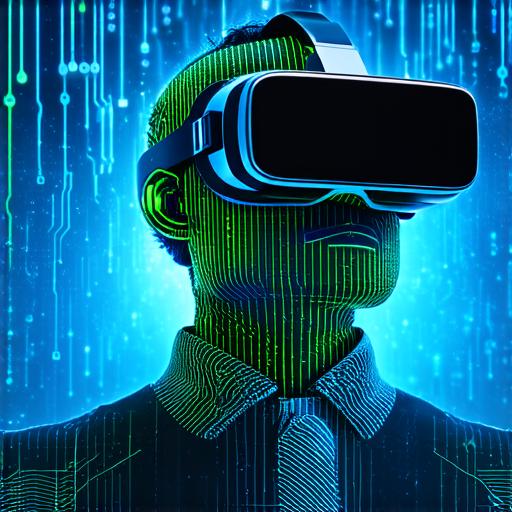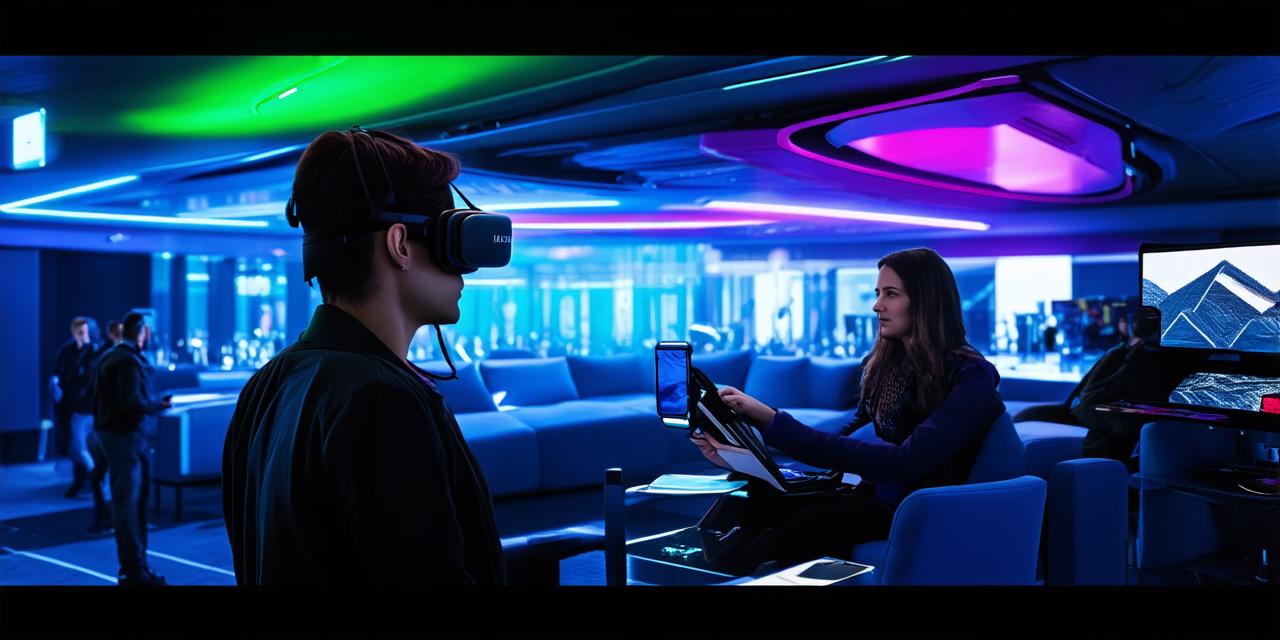Introduction
Virtual reality (VR) technology is rapidly advancing, and with it comes a growing body of research on its potential effects on cognitive development. VR offers an immersive and interactive experience that can engage users in ways that traditional media cannot, leading some to speculate that it may have positive effects on brain function. In this article, we will explore the current state of VR and its impact on cognitive development.
Virtual Reality: An Overview
Virtual reality is a computer-generated simulation that allows users to experience an artificial environment as if they were in a real-world setting. VR technology typically involves a headset, sensors, and controllers that track the user’s movements and allow them to interact with the virtual world. There are two main types of VR: immersive and non-immersive.
Immersive VR
Immersive VR, also known as room-scale VR, requires a large, dedicated space to set up and typically involves a full-body tracking system that allows users to move freely within the virtual environment.
Non-immersive VR
Non-immersive VR, on the other hand, is usually experienced through a computer screen or headset and typically does not require any special equipment beyond a standard mouse and keyboard.
Cognitive Development: An Overview
Cognitive development refers to the process by which the brain develops and matures over time, leading to improved cognitive function such as memory, attention, language, and problem-solving skills. The process of cognitive development is influenced by a variety of factors, including genetics, environment, and experience.
Impact of Virtual Reality on Cognitive Development
There have been several studies conducted that have examined the potential effects of VR on cognitive development in both adults and children. Some of these studies have found positive effects, while others have found no significant impact or even negative effects.
Positive Effects
One study published in Frontiers in Human Neuroscience found that immersive VR experiences can enhance working memory capacity in healthy older adults. Working memory is the ability to temporarily hold and manipulate information, which is crucial for tasks such as problem-solving and decision-making.
Another study published in the journal PLOS ONE found that non-immersive VR exposure can improve attention and cognitive flexibility in children with ADHD.
No Significant Effect or Negative Effects
A study published in the journal Computers & Education found no significant effect of VR on academic performance in students. Similarly, a review of the literature published in the journal Virtual Reality concluded that there is limited evidence to suggest that VR has a significant impact on cognitive development.
Case Studies and Personal Experiences
There are several examples of how VR technology has been used to enhance cognitive development in both children and adults. For example, some schools have used VR simulations to teach students about historical events or scientific concepts. In one case, a VR simulation was used to teach students about the solar system, leading to improved understanding of complex concepts such as gravity and celestial bodies.
Summary
In conclusion, there is growing interest in the potential impact of VR on cognitive development, both in children and adults. While some studies have found positive effects of VR on cognition, others have found no significant impact or even negative effects. Further research is needed to fully understand how VR might impact cognitive development and to determine the most effective ways to use the technology for this purpose.
FAQs
Virtual reality (VR) technology is rapidly advancing, and with it comes a growing body of research on its potential effects on cognitive development. VR offers an immersive and interactive experience that can engage users in ways that traditional media cannot, leading some to speculate that it may have positive effects on brain function. In this article, we will explore the current state of VR and its impact on cognitive development.
Virtual Reality: An Overview
Virtual reality is a computer-generated simulation that allows users to experience an artificial environment as if they were in a real-world setting. VR technology typically involves a headset, sensors, and controllers that track the user’s movements and allow them to interact with the virtual world. There are two main types of VR: immersive and non-immersive.
Immersive VR
Immersive VR, also known as room-scale VR, requires a large, dedicated space to set up and typically involves a full-body tracking system that allows users to move freely within the virtual environment.
Non-immersive VR
Non-immersive VR, on the other hand, is usually experienced through a computer screen or headset and typically does not require any special equipment beyond a standard mouse and keyboard.
Cognitive Development: An Overview
Cognitive development refers to the process by which the brain develops and matures over time, leading to improved cognitive function such as memory, attention, language, and problem-solving skills. The process of cognitive development is influenced by a variety of factors, including genetics, environment, and experience.
Impact of Virtual Reality on Cognitive Development
There have been several studies conducted that have examined the potential effects of VR on cognitive development in both adults and children. Some of these studies have found positive effects, while others have found no significant impact or even negative effects.
Positive Effects
One study published in Frontiers in Human Neuroscience found that immersive VR experiences can enhance working memory capacity in healthy older adults. Working memory is the ability to temporarily hold and manipulate information, which is crucial for tasks such as problem-solving and decision-making.
Another study published in the journal PLOS ONE found that non-immersive VR exposure can improve attention and cognitive flexibility in children with ADHD.
No Significant Effect or Negative Effects
A study published in the journal Computers & Education found no significant effect of VR on academic performance in students. Similarly, a review of the literature published in the journal Virtual Reality concluded that there is limited evidence to suggest that VR has a significant impact on cognitive development.
Case Studies and Personal Experiences
There are several examples of how VR technology has been used to enhance cognitive development in both children and adults. For example, some schools have used VR simulations to teach students about historical events or scientific concepts. In one case, a VR simulation was used to teach students about the solar system, leading to improved understanding of complex concepts such as gravity and celestial bodies.
Summary
In conclusion, there is growing interest in the potential impact of VR on cognitive development, both in children and adults. While some studies have found positive effects of VR on cognition, others have found no significant impact or even negative effects. Further research is needed to fully understand how VR might impact cognitive development and to determine the most effective ways to use the technology for this purpose.
FAQs
Virtual reality (VR) technology is rapidly advancing, and with it comes a growing body of research on its potential effects on cognitive development. VR offers an immersive and interactive experience that can engage users in ways that traditional media cannot, leading some to speculate that it may have positive effects on brain function. In this article, we will explore the current state of VR and its impact on cognitive development.
Virtual Reality: An Overview
Virtual reality is a computer-generated simulation that allows users to experience an artificial environment as if they were in a real-world setting. VR technology typically involves a headset, sensors, and controllers that track the user’s movements and allow them to interact with the virtual world. There are two main types of VR: immersive and non-immersive.
Immersive VR
Immersive VR, also known as room-scale VR, requires a large, dedicated space to set up and typically involves a full-body tracking system that allows users to move freely within the virtual environment.
Non-immersive VR
Non-immersive VR, on the other hand, is usually experienced through a computer screen or headset and typically does not require any special equipment beyond a standard mouse and keyboard.
Cognitive Development: An Overview
Cognitive development refers to the process by which the brain develops and matures over time, leading to improved cognitive function such as memory, attention, language, and problem-solving skills. The process of cognitive development is influenced by a variety of factors, including genetics, environment, and experience.
Impact of Virtual Reality on Cognitive Development
There have been several studies conducted that have examined the potential effects of VR on cognitive development in both adults and children. Some of these studies have found positive effects, while others have found no significant impact or even negative effects.
Positive Effects
One study published in Frontiers in Human Neuroscience found that immersive VR experiences can enhance working memory capacity in healthy older adults. Working memory is the ability to temporarily hold and manipulate information, which is crucial for tasks such as problem-solving and decision-making.
Another study published in the journal PLOS ONE found that non-immersive VR exposure can improve attention and cognitive flexibility in children with ADHD.

No Significant Effect or Negative Effects
A study published in the journal Computers & Education found no significant effect of VR on academic performance in students. Similarly, a review of the literature published in the journal Virtual Reality concluded that there is limited evidence to suggest that VR has a significant impact on cognitive development.
Case Studies and Personal Experiences
There are several examples of how VR technology has been used to enhance cognitive development in both children and adults. For example, some schools have used VR simulations to teach students about historical events or scientific concepts. In one case, a VR simulation was used to teach students about the solar system, leading to improved understanding of complex concepts such as gravity and celestial bodies.
